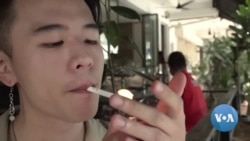Shortly after finishing her lunch at a Malaysian food court, Emily Lee, a 21-year-old university student, stepped outside, pulled out a cigarette and lit it up. “I usually smoke one pack per day,” she said. “I almost always smoke right after a meal.”
Lee said she started smoking when she was 17, a year below the legal age to smoke in Malaysia. “I had a bunch of friends who were smoking, so I started and quickly got addicted to the nicotine.”
Government statistics show that 1 in 5 Malaysians 15 years of age and older smoke, including about 40% of the men. There are more than 27,000 smoking-related deaths in the country annually.
“This is a major problem because a lot of people are losing their lives because of smoke-related lung cancer,” said Azrul Mohd Khalib the chief executive officer of the Galen Centre for Health and Social Policy, a nonprofit health and policy research organization. However, Malaysia’s health minister, Khairy Jamaluddin, has announced plans to permanently ban the sale of all tobacco and smoking products including vapes as well as e-cigarettes to anyone born after the year 2005 as part of a “generational end game” for smoking in the country.
This proposal comes after New Zealand announced plans to raise the legal smoking age by one year each year to permanently ban the sale of tobacco to anyone born after 2008.
Malaysia’s proposal has drawn praise from many of the country’s leading health advocates. “It means there’s going to be a lot fewer new smokers in the years to come,” said Azrul calling the proposal “a great idea.”
But there’s a lot of skepticism that it will actually work.
“The intention is good, but I don’t know if it will actually stop anyone from smoking,” Lee said. “Stores don’t always check IDs; older people will buy for someone who’s underage, plus, so many smokers just buy cigarettes under the table because they’re so much cheaper.”
It’s widely known across Malaysia that there’s a thriving black market for tobacco products. A study conducted in 2020 by the Confederation of Malaysian Tobacco Manufacturers concluded that more than 60% of cigarettes consumed in the nation were from the black market.
In several convenience stores, employees, upon request, brought out from under the counter illegally imported cigarettes. They often sell for less than half the price of legal ones.
“It’s [the proposed ban] not going to reduce consumption it’s only going to increase the illegal consumption of cigarettes, which in Malaysia is already extremely high,” said Carmelo Ferlito, chief executive officer of the Center for Market Education, a libertarian think tank in Malaysia.
Ferlito thinks if Parliament passes the proposal it will lead to a situation similar to what happened during prohibition in the United States during the 1920s when a ban on alcohol led to a massive underground market run by organized crime.
“So, we [Malaysia] will have our very own Al Capone [crime boss] for tobacco smuggling,” Ferlito told VOA.
Azrul acknowledges the challenges the country’s black market poses towards the proposal’s chances of preventing a significant number of Malaysians from starting to smoke or vape. “The policy will succeed if we are able to crack down on the issues of corruption, of lack of enforcement but also political will,” Azrul said. “But it will fail if society fails to support the policy.”
The proposed age ban also raises financial concerns for many businesses as the country tries to bounce back from the economic impact of the coronavirus pandemic.
The Malaysia Singapore Coffee Shop Proprietors General Association, whose membership includes many owners of semi-enclosed open-air food courts that are popular across Malaysia, released a statement calling the plan “a step in the right direction but Malaysia is not ready.”
The association said the proposal will drive more smokers to the black market and “severely jeopardize the livelihood of our 20,000 merchants.” The association said cigarette sales account for about 30% of the revenue of its members.
Ferlito said people smoke for pleasure and the government won’t be able to stop this. “A more successful strategy would be eventually to direct people toward less harmful products such as vaping,” Ferlito said.
But Azrul of the Galen Centre for Health and Social Policy disagrees.
“We see smokers who are transitioning to vape thinking that they can quit smoking that way but end up with another form of addiction for which they need treatment for,” said Azrul. “Today we are treating both smokers and vapers in our smoking cessation clinics.”
Among the public, the proposed age ban for tobacco and smoking products is getting mixed reviews.
“It’s not going to work,” said Ni’ Aliah Amira a 21-year-old university student who vapes regularly. “People are going to find all of those [loop] black holes.”
Jordan Lee (no relation to Emily), a 25-year-old non-smoker, supports the proposed age ban. “If society at large wants it to work it will work,” Lee said. “We should give it a try.”









